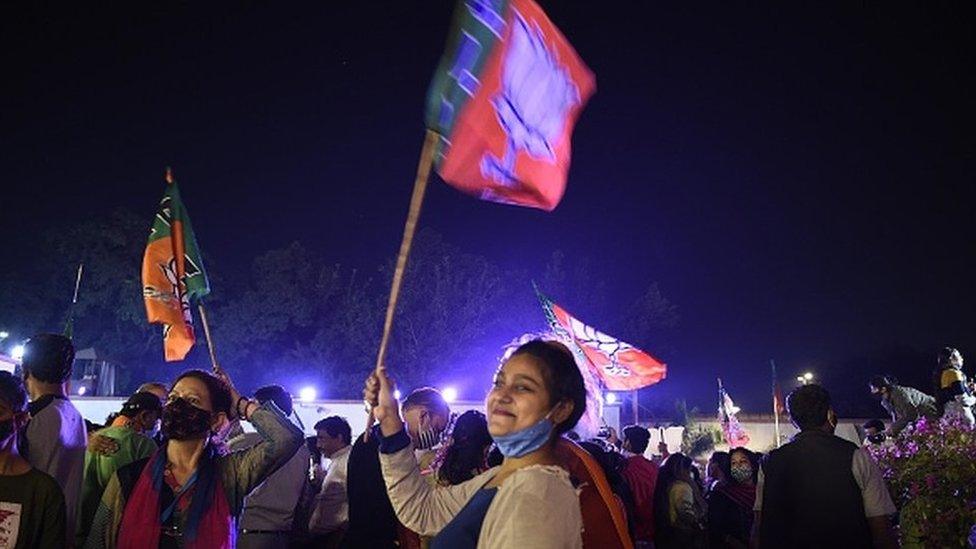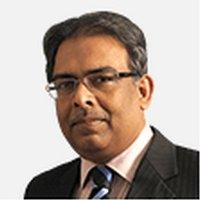Tejashwi Yadav: Bihar's promising new leader in Indian regional politics
- Published
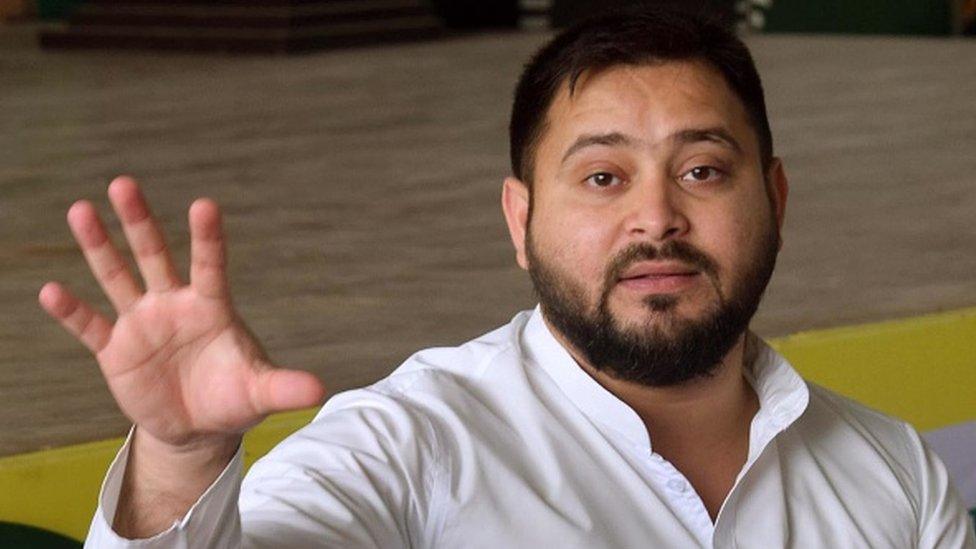
Tejashwi Yadav's RJD emerged as the single-largest party in Bihar
As a cricketer, Tejashwi Yadav was a flop.
The political dynast had dropped out of school to pursue a career in cricket. He scored a paltry 37 runs in seven first class games and spent four seasons on the Delhi team's bench in the prestigious Indian Premier League. Mr Yadav quit the game in 2012 and plunged into politics in his home state of Bihar.
This time exit polls for elections in Bihar predicted, external his time had come. They said Mr Yadav's regional Rashtriya Janata Dal (RJD)-led alliance would outperform the ruling Janata Dal (United) or JD-U coalition against the run of play. The alliance which has run Bihar for 15 years is helmed by Nitish Kumar, one of India's most influential regional leaders, whose star is on the wane. But the alliance also counted Narendra Modi's BJP as a key partner: the prime minister addressed well-attended campaign meetings in the state to boost his ally's re-election.
Mr Yadav had arrived late to the party. The odds were seemingly stacked against him. His adversaries mocked him as a political lightweight.
More importantly, he had to shed the spotty legacy of his father, Lalu Prasad Yadav, who is serving a prison term for corruption. A colourful and avowedly secular leader, the 72-year-old strongman's 15-year-old rule in Bihar had gained notoriety for misrule and corruption. On the stump, Mr Modi evoked memories of the "law of the jungle" in one of India's poorest states.
But like most political dynasts, Mr Yadav also had a head start. In a state where caste loyalties are unbending, Mr Yadav inherited from his father the allegiance of a third of the voters, largely belonging to his Yadav caste and Muslims. This was a coalition that Lalu Prasad Yadav had painstakingly stitched together: he described his politics as one of "social justice and equality", ranged against the historical tyranny of upper castes in a feudal state.
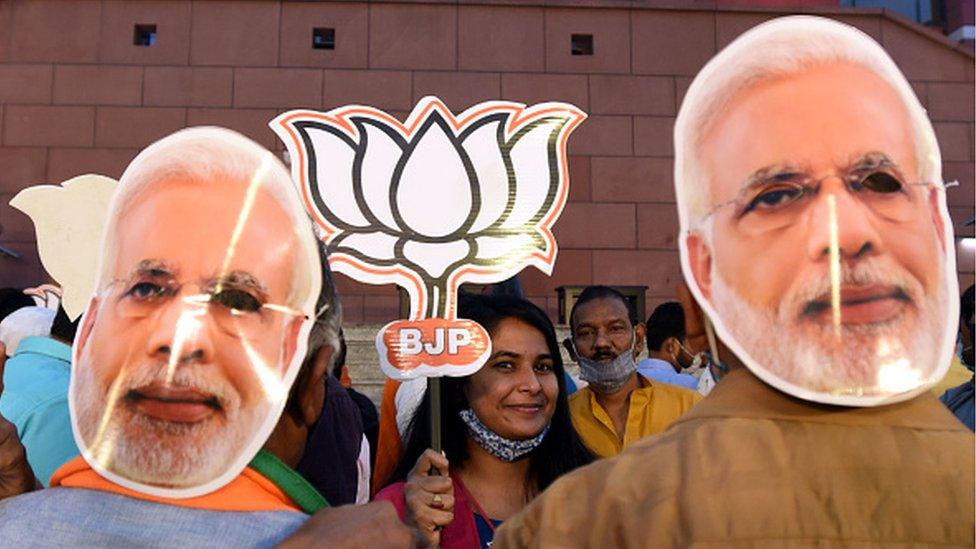
Mr Modi's popularity remains undiminished
Mr Yadav ran a brisk campaign. He kept his speeches short and crisp, put caste on the backburner and spoke relentlessly about jobs, healthcare and education. He "represents a rebranding of his father's social justice politics and his success and support are inseparable from this legacy", Jeffrey Witsoe, a political anthropologist who has studied caste in Bihar, says.
Mr Yadav kept his family - he is the youngest of his parents' nine children - out of the campaign. Now it was the time for Mr Kumar to face the heat, he said.
Yet, Mr Yadav fell short.
His party won more than half of the seats -75 of 144 - it contested and emerged as the single largest party. But the party's main ally Congress struggled - winning just 19 of the 70 seats it contested - and dragged down the coalition. Mr Kumar's rainbow coalition won the tight fight.
"Tejashwi did a good job. He got his party back in the game. He enthused his voters, but failed to expand his base," says Rahul Verma, a fellow at the Centre for Policy Research, a Delhi-based think tank.
Winning more than half of the seats it contested - 74 out of 110 - the BJP emerged as the senior partner in the winning alliance for the first time. This is significant because Bihar is also the only big state in India's sprawling and politically febrile "Hindi-speaking heartland" that the BJP has not won on its own.
Ruling Bihar on its own is still some distance away. But the BJP has arrived in Bihar, say analysts, on the back of welfarism, religious polarisation, a clear understanding of caste dynamics, a hard-working party organisation, vast resources and support of the large sections of mainstream media.
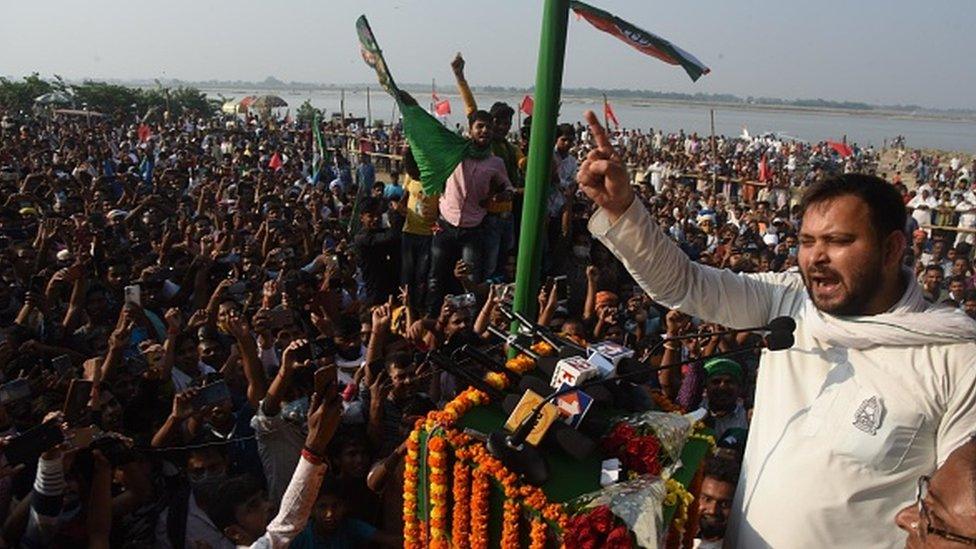
Throwing caution to winds, Mr Yadav ran a brisk campaign
Much of its performance in Bihar can be also attributed to the undiminished popularity of Mr Modi, who has "transformed into a brand", according to Suhas Palshikar, a leading political scientist. "Like a brand it can be used in any state, any context and against any competition," he says.
The Bihar elections clearly show Mr Modi continues to be India's most popular leader. At the same time, Mr Modi's party itself has a mixed record in state elections - the BJP has lost more elections than it has won in the past six years. It has not won a clear majority in any state since polls in Uttar Pradesh four years ago.
Mr Yadav's fighting performance, believe analysts, also demonstrates that there is a new template emerging in India's elections.
"Keep the election local, focus on local issues and field strong local leaders. Don't go national, and don't attack Mr Modi. Match your leader with a rival regional leader," says Mr Verma.
In other words, Mr Modi's BJP will continue to remain the dominant federal party with an expanding pan-Indian footprint in the near future even as regional parties fight to recover from their past debacles.
But the overwhelming dependence on Mr Modi and the failure to win state elections "will begin to stick to Mr Modi sooner or later - not just in the minds of outsiders, but within the BJP", says Mr Palshikar. Mr Yadav, who turned 31 on Monday, has time on his side.

Read more from Soutik Biswas

Follow Soutik on Twitter, external
- Published28 October 2020
- Published11 November 2020
